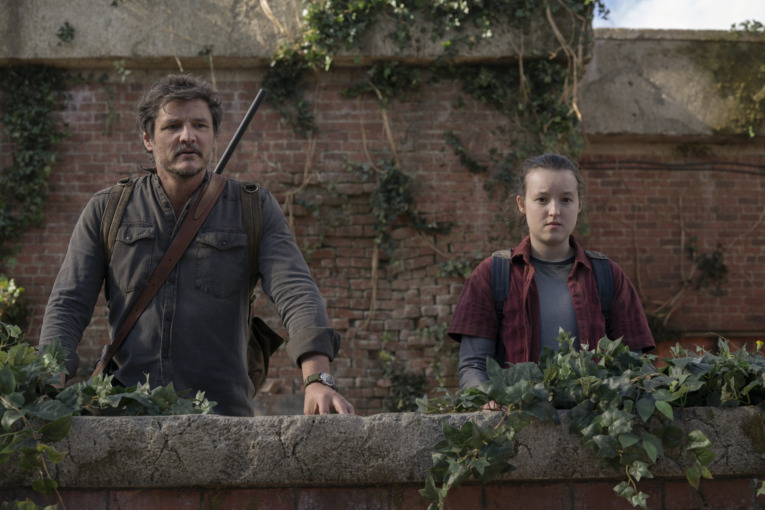Pedro Pascal and Bella Ramsey’s emotional complexity shines in HBO’s The Last of Us season finale, “Look for the Light.” Through challenging explorations of love, honesty and violence, the show cements itself as one of the best video game adaptations in recent times.
*The rest of this article contains spoilers for the above-mentioned episode, as well as some aspects of The Last of Us: Part I video game.
Anna’s Legacy, Marlene’s Responsibility

Though we hear about her off and on, we never get to see the story of Ellie’s mother, Anna, in the game. It is uniquely appropriate, then, that the first time we experience it is with Ashley Johnson playing Anna. The woman who voices Ellie in the game giving birth to Ellie in the show is exactly the level of emotional intention that has made this adaptation a thing of rare beauty. It also adds deeper meaning to Marlene’s (Merle Dandridge) place in this story.
We’ve known since the first episode that Marlene brought Ellie to the Boston QZ when she was a baby. What we we didn’t know, however, was the traumatic events leading up to that. Even game players didn’t know the full story. It’s never clear in the game exactly how Anna died. We’re never told she was bitten during Ellie’s birth, or that it’s Marlene who had to kill her before the infection took hold.

“I failed you, Anna,” are the words we hear Marlene utter in a recording in the game. They resonate so much more now that we know the true depths of her connection to Ellie’s life. She killed Ellie’s mother, her best friend. Now, in order to fulfill her purpose, she has to all but kill Ellie, too.
Marlene, as one of the leaders of the Fireflies, has dedicated most of her life post-outbreak to the cause of reinstating civilization. The possibility of a cure for the Cordyceps infection is their biggest hope. It’s something Marlene fights for, something her people die for. The promise of a world saved from the darkness of a fungus that swallowed it whole.
This is Marlene’s purpose.
It is not Joel’s.
Joel’s Confessions, Ellie’s Light

We know Joel’s extreme protectiveness of Ellie stems from his refusal to lose another child. But there is one addition to this part of the story that shows just how much Ellie, as Ellie, has changed him.
Joel’s attempt to take his own life is never mentioned in the game. However, I would be lying if I said I never wondered about the possibility. One of the undeniable truths of this story, regardless of which version you experience, is that Joel’s world didn’t end with the outbreak of the cordyceps infection. His world ended when Sarah died.
For twenty years, Joel lived in the shadow of a world he couldn’t bring himself to care about. So, when he tells Ellie that it wasn’t time that healed his wounds, we know that to be true. Only with Ellie’s intrusion into his life was Joel finally able to see the light of new possibilities, of a new world.
Joel might not be the only person who cares for Ellie – Marlene holds that position as well – but he is the only one who is willing to sacrifice the world instead of her. The reason is just as simple as it is complex: Ellie is his world now.
She is Joel’s purpose.
But what is hers?
Ellie’s Purpose, Joel’s Burden

A major aspect of the show is Ellie’s need for her immunity to mean something. The cordyceps infection has taken nearly every person she’s ever cared about, and the loss weighs heavier on her with each passing. Though she’s only fourteen, Ellie isn’t someone to back down from what she views as her responsibility. That is never more apparent than in this episode.
When Joel tells her they can turn around, go back to Jackson and forget about the cure, Ellie refuses. She tells him, “I know you mean well. I know you want to protect me. You have … but there’s no halfway with this. We finish what we started.”
Ellie has made her choice. More accurately, she made it back in episode five when she tried to save Sam with her own blood. She has known her purpose for a while, and, though the motivation is different, it lies much more closely to Marlene’s than it does Joel’s.
Something she says to Joel in the middle of her declaration, though, puts everything in a grey area. She promises him that, when everything’s done, “we’ll go wherever you want to go. Tommy’s, sheep ranch, the moon. I’ll follow you anywhere you go.”
Ellie has decided her purpose, yes, but she doesn’t yet know that the cost will be something Joel is unwilling to pay.
Love’s Carnage

In The Last of Us: Part I, Joel’s rampage through the Firefly hospital is told completely through active gameplay. As Joel, we have to either kill or sneak our way through the dozens of Fireflies trying to stop us. Only about four deaths are absolutely necessary, leaving room for the adaptation to decide how they wanted to conduct Joel’s violent mission.
Given how the show has crafted its explorations of violence thus far, it should come as no surprise that the creators chose to lean all the way in. What might surprise some, however, is the absolute power that comes from a short sequential montage set in relative silence.
Pedro Pascal carries this montage without uttering a single word. Somehow conveying both emptiness and determination, he shows us through Joel’s face alone what love can do to a person. It can enlighten and darken in one breath. It can destroy just as quickly as it can save.

As Joel makes his way from person to person, pulling the trigger without so much as a blink of an eye, we see the worst outcome of love. We see carnage.
Later, when Joel lies to Ellie about the cure and about a raid at the hospital, we are reminded of how much Ellie didn’t want this to happen. She asks him if anyone was hurt, her concern placed solely on the very people Joel himself just murdered. Including the one person left connected to both Anna and Riley: Marlene.
Though we perhaps aren’t meant to know whose purpose is “more” in the right, Joel’s or Marlene’s, they both ignore one important aspect: Ellie’s right to a choice.
Truth’s Lies

Neither the Fireflies nor Joel allow Ellie the opportunity to choose her own destiny based on all the facts. Both fight for some semblance of a new world, and in the carnage, Ellie is left to bear the weight of their choices.
The tragedy of it all is that we know what Ellie would have chosen.
So does Joel.
If the game is any indication, viewers will undoubtedly disagree about Joel’s choices throughout this final episode. Some will defend him at all costs, arguing that the Fireflies were more in the wrong. Some will defend the Fireflies and condemn Joel. This split only means that the story has done what it set out to do.

One of the reasons The Last of Us has resonated so well with people over the last decade is that it asks audiences to challenge their comfort. The continuation and expansion of this in the show only makes it resonate more. What happens when there is no hero or villain? What happens when both sides are fighting for worthy causes? How do we balance our love for someone with our knowledge of their wrongdoings?
There are no easy answers to these questions. There is only Ellie, begging Joel to be as honest with her as she always has been with him. There is only Joel, lying to Ellie because he’s afraid of what she might do.
There is only a choice, made out of the need to trust the one person she has left in this world, uttered in the form of “Okay.”
Where will Joel’s choices lead? Game players have some idea. Everyone else? Look for the light … we’ll see you during season two.


 Researcher, writer, fangirl, and book hoarder, Danielle is an American living in the U.K. Her interests include, but are not limited to: Star Wars, The Bear, The Last of Us, Marvel, and anything to do with Edgar Allan Poe. She is best known through her TikTok account @writteninthestarwars where she covers a wide range of fandom content.
Researcher, writer, fangirl, and book hoarder, Danielle is an American living in the U.K. Her interests include, but are not limited to: Star Wars, The Bear, The Last of Us, Marvel, and anything to do with Edgar Allan Poe. She is best known through her TikTok account @writteninthestarwars where she covers a wide range of fandom content. Researcher, writer, fangirl, and book hoarder, Danielle is an American living in the U.K. Her interests include, but are not limited to: Star Wars, The Bear, The Last of Us, Marvel, and anything to do with Edgar Allan Poe. She is best known through her TikTok account @writteninthestarwars where she covers a wide range of fandom content.
Researcher, writer, fangirl, and book hoarder, Danielle is an American living in the U.K. Her interests include, but are not limited to: Star Wars, The Bear, The Last of Us, Marvel, and anything to do with Edgar Allan Poe. She is best known through her TikTok account @writteninthestarwars where she covers a wide range of fandom content.






3 thoughts on “‘The Last of Us’ Season Finale | Look for the Light”